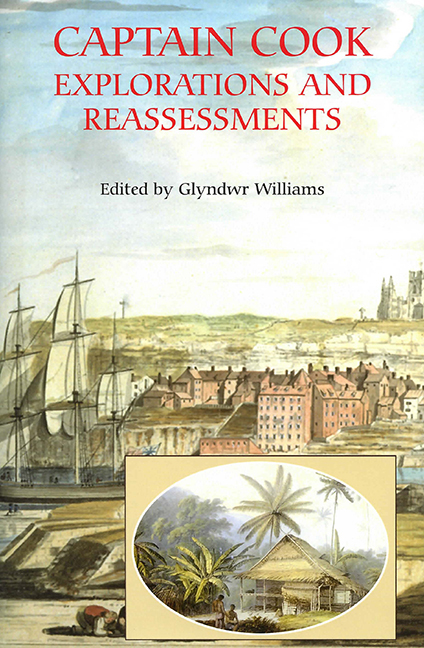Book contents
- Frontmatter
- Contents
- List of illustrations
- Contributors
- Acknowledgements
- Abbreviations
- Introduction
- Part I The Years in England
- Part II The Pacific Voyages
- 4 ‘Notwithstanding our signs to the contrary’: textuality and authority at the Endeavour River, June to August 1771
- 5 Tute: the impact of Polynesia on Captain Cook
- 6 Some thoughts on Native Hawaiian attitudes towards Captain Cook
- 7 Captain Cook's command of knowledge and space: chronicles from Nootka Sound
- Part III Captain Cook and his Contemporaries
- Part IV The Legacy of Captain Cook
- Index
5 - Tute: the impact of Polynesia on Captain Cook
from Part II - The Pacific Voyages
Published online by Cambridge University Press: 25 October 2017
- Frontmatter
- Contents
- List of illustrations
- Contributors
- Acknowledgements
- Abbreviations
- Introduction
- Part I The Years in England
- Part II The Pacific Voyages
- 4 ‘Notwithstanding our signs to the contrary’: textuality and authority at the Endeavour River, June to August 1771
- 5 Tute: the impact of Polynesia on Captain Cook
- 6 Some thoughts on Native Hawaiian attitudes towards Captain Cook
- 7 Captain Cook's command of knowledge and space: chronicles from Nootka Sound
- Part III Captain Cook and his Contemporaries
- Part IV The Legacy of Captain Cook
- Index
Summary
Without doubt, Captain James Cook was one of the world's great explorers. During his three Pacific journeys his wooden ships circled the world, navigating the ice-bound fringes of the Antarctic and Arctic circles, where sails froze solid and the rigging hung with icicles; sailed into tropical seas, where they survived hurricanes, lightning strikes and volcanic eruptions; edged around uncharted lands and islands, always in danger of shipwreck; and in one harbour after another, found unknown peoples. For any time and in any culture, these were remarkable voyages, like the journeys of Odysseus, or the Polynesian star navigators.
At the same time, Captain Cook has become an icon of imperial history. His voyages epitomise the European conquest of nature, fixing the location of coastlines by the use of instruments and mathematical calculation, classifying and collecting plants, animals, insects and people. As the edges of the known world were pushed out, wild nature – including the ‘savages’ and ‘barbarians’ at the margins of humanity – was brought under the calm, controlling gaze of Enlightenment science, long before colonial domination was attempted. Cook's Pacific voyages, and his life and death, thus provoke reflection about the nature of history, and the impartiality of its explanations. Tales of the European discovery of the world are still shaped by imperial attitudes; and accounts of the great voyages of exploration are often written as epics in which only the Europeans are real. They travel in seas which had been traversed for centuries, ‘discovering’ places long inhabited by others. Yet terra nullius, the ‘empty lands’, were only empty because their people had been reduced to ciphers, ‘savages’ without the power to shape the future, to influence the Europeans and to change them.
In reflecting upon these great voyages, one must avoid the trap of Cyclops, with his one-eyed vision. Rather, we can draw on the perception, shared by James Cook himself, that in his journeys of Pacific exploration, Europeans and ‘natives’ alike were only human. On each side, there was savagery and kindness, generosity and greed, intelligent curiosity and stupidity. Maori, Tahitians and other Pacific Islanders engaged with Cook's men in ways that were defined by their cosmology and culture, just as Cook's men were shaped by the cosmology and culture of Georgian England. During their successive encounters with Polynesians, European voyagers and Polynesians alike were transformed.
- Type
- Chapter
- Information
- Captain CookExplorations and Reassessments, pp. 77 - 93Publisher: Boydell & BrewerPrint publication year: 2004

